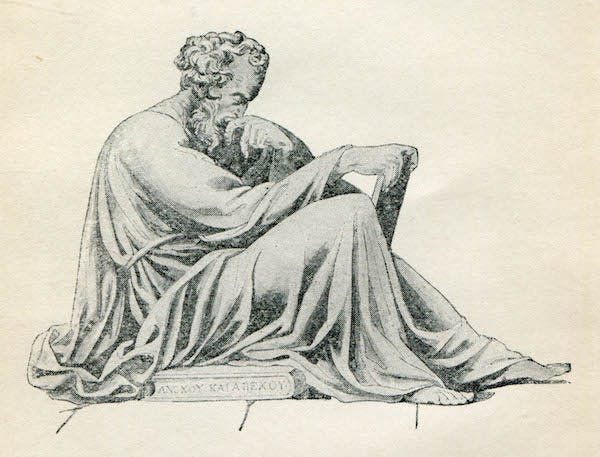Should we not be disturbed by the death of a loved one?
An infamous passage in Epictetus’s Manual is the source of endless dismissals of Stoicism as ethical philosophy
Epictetus was a slave-turned-teacher who lived at the end of the first and beginning of the second centuries of the modern era. He influenced Marcus Aurelius, several Christian theologians throughout the Middle Ages, as well as a number of the Founding Fathers of the American Republic. Still today he is one of the towering figures in practical philosophy, and the one who hooked me into Stoicism. Yet, read the following passage and see how you react:
“When faced with anything you find attractive, useful, or lovable, remember to tell yourself what kind of thing it is. Start with the least important things. If it’s a jug you like, say, ‘I like a jug,’ because then you won’t be upset if it gets broken. If you kiss a child of yours or your wife, tell yourself that you’re kissing a human being, because then you won’t be upset if they die.” (Enchiridion 3)
Wait, what?? “You won’t be upset if they die?” What sort of psychopath writes that sort of thing? But Epictetus was not a psychopath. The little we know about his life includes an anecdote to the effect that in his old age he adopted an infant in order to avoid that the child be left to die. That’s not the behavior of someone who is callous about his loved ones. Indeed, notice in the passage above that he regards jugs and other such things as “least important things,” implying that one’s child and wife are among the most important things. What gives, then?
Some people point out that, in the time of Epictetus, losing a love one wasn’t that much less infrequent than breaking a jug, unfortunately. Child mortality was very high, and so was women’s likelihood to die in childbirth. Not to mention wars, random violence, and the occasional pestilence. Just to give you an idea of the context, Marcus Aurelius—despite having access to the best resources the Roman Empire had available—had 14 children, only five of whom survived to adulthood (among them only one male, the infamous Commodus).
While this is true, it misses the point. Epictetus himself provides us with a strong clue to what I think is the real motivation behind the startling quote in Enchiridion 3. In Discourses II.5 he tells us of a foot that has to step in the mud. If considered from the narrow point of view of the foot, stepping into the mud is disgusting. Why would anyone want to do it? But if the foot understands that it is part of a larger body, and that it is the proper function of a foot to bring the body home, regardless of how unpleasant the task may be, then the foot will not only do it, but do it gratefully.
This is where Nietzsche, much later on, got his famous amor fati: love your fate. If you think, as the ancient Stoics did, that the universe itself is a living organism endowed with reason (the famous logos), that we are functional parts of that organism—as the foot is with respect to the body—and that therefore whatever happens to us, however unpleasant, is for the good of the whole, then of course you ought to accept events with gladness, regardless of the fact that, when seen from a more narrow perspective, they may be painful.
It is a truly beautiful view of existence. I wish I could believe it. But as a modern scientist I simply don’t see any reason to regard the cosmos as anything other than the dynamic set of processes described by fundamental physics. No logos, no providence, and therefore no amor fati.
Does that I can’t, therefore, coherently be a Stoic? So say so-called “traditional Stoics,” who actually claim to believe in the ancient pantheism. I wrote a whole book updating Epictetus’s Enchiridion to the 21st century to reject their strict and unnecessarily straightjacketing reading of this incredibly useful philosophy.
Recently, though, my colleague Chris Gill, one of the original founders of the Stoicon and Stoic Week events, not to mention a superb scholar of ancient philosophy, has published a book in which he argues, among other things, that Enchiridion 3 is so often misunderstood in part because people just don’t bother to read the much broader context provided by Epictetus’s main opus, the Discourses.
(The book is Learning to Live Naturally: Stoic Ethics and its Modern Significance, but is unfortunately pretty expensive, as is often the case with academic volumes. You can read an in-depth review of it by another dean of modern Stoicism, John Sellars.)

The premise of Gill’s re-analysis of Enchiridion 3 is that Epictetus’s “Manual” (which, like the Discourses, was not actually written by Epictetus, but by his brilliant student Arrian of Nicomedia) is not an introductory text to Stoic philosophy, but rather a summary for advanced students. If, therefore, someone approaches the Enchiridion thinking that it’s going to be easy and short they are going to be sorely mistaken, opening themselves up to gross misunderstandings.
That is why for the rest of this essay we are going to follow Gill’s suggestion and take an in-depth plunge into the 24th section of the third book of the Discourses, which provides the proper context for the infamous passage about not being too distraught when your loved ones die. (Gill also refers his readers to Discourses IV.1, which focuses on Epictetus’s concept of freedom. But that’s a conversation for another time.) So let’s take a look and see if by the end we haven’t changed our mind about what the Stoic master really thinks about jugs and people.
Discourses III.24 is aptly entitled “On the necessity of not being attached to things that are not up to us.” The reference is to the crucial distinction Epictetus makes (in Enchiridion 1) between what is and is not up to us. Up to us are our judgments, decisions to act or not to act, as well as our values and disvalues. All other things, including our health, wealth, career, reputation, and so forth is not up to us in the sense that we can influence them (via what is up to us), but they also depend on external factors, like events and other people’s opinions and decisions. Clearly, neither the breaking of a jug nor the death of our loved ones is up to us, in this specific sense. This explains what Epictetus says early on in this section of Discourses:
“Nature created everyone for happiness and self-possession. She supplied them with the resources to achieve this by giving each individual some things that are his and others that aren’t. Those that are subject to impediment, removal, and constraint aren’t his, while those that aren’t subject to impediment are. And, as was only right and proper for one who cares for us and protects us, she included what is essentially good and bad among the things that are up to us. ‘But I’ve parted company with him, and he’s in pain.’ Yes, but why did he regard what was not his as his? Why, when he was enjoying seeing you, didn’t he take account of the fact that you’re mortal, that you’re bound to leave for elsewhere? So he’s paying the penalty for his own foolishness. But what are you paying for? Why are you feeling sorry for yourself? Can it be that you, too, have failed to pay attention to the facts? Have you, too, been enjoying everything—places, people, lifestyle—on the assumption that they’d be there for you forever?” (Discourses III.24.2-5)
The student who is talking to Epictetus has not really understood the difference between what is and is not up to him. He complains that his friend is in pain because they are not together, and Epictetus reminds him that it is in the nature of people to be together some time but not all the time, and not forever. Instead of complaining when our friends have left, why not focus on enjoying their company while they are with us? He then goes on to elaborate:
“How can someone be good if he doesn’t know who he is? And no one knows who he is if he’s forgotten that everything that’s born will die, and that no two people can be together forever. So wanting the impossible is slavish, idiotic, and the mark of someone who’s a stranger in the world and is fighting Nature with the only weapons at his command, his judgments. ‘But my absence makes my mother sad.’
Yes, but why hasn’t she taken these principles on board? I’m not saying you shouldn’t try to relieve her sadness, but I am insisting that a person shouldn’t unconditionally want what isn’t his.” (Discourses III.24.20-22)
The student’s mother is distraught, and Epictetus says that it is the duty of the student to alleviate her pain. But he also points out that she is, in a sense, being impious, because she wants something from Nature (or God, which is the same, for the Stoics) that she cannot possibly have.
For Epictetus this is the source of human unhappiness: rather than appreciating what we do have we complain about what we no longer have. That, says Epictetus, is the mark of someone who is a stranger in the world, because they don’t take seriously how the world actually works.
“‘But what if friends of mine in Rome die?’ Well, that’s just the death of some mortal beings. Do you really expect to reach old age without seeing the death of any of those you love along the way? Don’t you realize that over a long stretch of time all sorts of different things are bound to happen? A fever will get the better of one, a robber of another, a tyrant of a third. That’s the nature of the world we live in; that’s the nature of the people who live in it alongside us.” (Discourses III.24.27-29)
Again, Epictetus reproaches his student for seemingly living like an ostrich with its head in the sand, preferring to indulge in fantasies rather than seeing the nature of the world for what it really is. Incidentally, my friend and colleague Brian Johnson has suggested to me that this is one way to visualize Epictetus talking to his students (he’s the one yelling at Rocky):
A bit later on we can imagine Epictetus getting a bit more soft, empathizing with his student, and yet reminding him of their common role model:
“What’s stopping you from loving someone knowing that he’s mortal and is likely to leave for elsewhere? Didn’t Socrates love his sons?” (Discourses III.24.60)
Yes, Socrates loved his sons, but he was aware that both his sons and himself were mortal. And he did not hesitate to risk his life when it was required, as when he fought valiantly at the battle of Potidaea during the Peloponnesian War, where he saved the life of his friend Alcibiades. He also did not hesitate to give his life to the city that had unjustly condemned him for impiety and corruption of the youth, because one cannot pick and choose when to obey the law and when to escape it.
Shortly thereafter we get a hint that the famous fundamental rule about what is and is not up to us, which Epictetus made central to his version of Stoicism, came from the Stoics’ close cousins, the Cynics:
“How did Antisthenes set [Diogenes the Cynic] free? Listen to what he says: ‘He taught me what’s mine and what isn’t. Possessions aren’t mine. Relatives, family, friends, fame, familiar places, familiar patterns of life—he taught me that none of these are mine.’ ‘What is yours, then?’ ‘The use of impressions. He showed me that this is something I have that’s unimpeded and unconstrained. No one can obstruct me and no one can compel me to use impressions except as I wish.” (Discourses, III.24.69-69)
“Impressions” in Stoic (and Cynic) psychology are automatic judgments that struck us either via the senses (e.g., “there goes a yummy gelato, it would be good to eat it!”) or by way of internal mental processing (e.g., “the square root of nine is four”). A great part of Epictetus’s teachings deal with the notion that we should never assent to an impression without pausing and taking the time to interrogate it, to make sure that it is a true impression and not a mistake. Maybe the gelato is yummy, but I’m going home to join my family for dinner, and I really shouldn’t spoil my appetite. And the square root of nine is three, not four.
“If you kiss your child or your brother or your friend, never give the impression free rein. Don’t allow it to expand as much as it wants, but hold it back: curb it in the same way that those who stand behind generals as they’re celebrating a triumph remind them of their humanity. In much the same way, you, too, should remind yourself that what you love is mortal. It isn’t something that belongs to you; it’s been given to you for the time being, not as something irremovable or permanent. It resembles a fig or grapes, in the sense that they arrive at a particular time of the year and it would be stupid to long for them in winter. So if you long for your son or your friend at a time when they aren’t given to you, you’re longing for a fig in winter, believe me. As winter is to a fig, so every circumstance given by the universe is to the things that are destroyed by that circumstance.” (Discourses, III.24.85-87)
And now you understand why this newsletter is called “Figs in Winter”! It’s Epictetus’s metaphor for something that is unnatural, and that, if we insist on it, will make fools of us. Figs are a summer fruit, and we ought to enjoy them while they are around. Once they’re gone, it’s useless to wish for them, and much better to enjoy whatever the winter affords us instead.
The same goes for friends and loved ones. They too, since they are human beings, have a proper season. And in their case as well it is far better to focus on being happy when they are with us, rather than on regretting them when they are not.
The reference to the people standing behind generals during a triumph is a staple of Stoicism, often referred to as memento mori, remember that you will die. In ancient Rome a triumph was the highest honor accorded to a victorious general who had won important battles. It was an occasion for pomp and circumstance, and it was easy for the man at the center of everyone’s attention to get his head swollen with pride. That’s why generals, and even emperors, would have someone riding with them on their chariot whose task was to occasionally whisper in their ear: “memento mori…” in order to bring them back down to earth.

But of course plenty of people don’t want to even talk about death and such. They think it’s an ill omen, it will bring misfortune. My Neapolitan grandmother was certainly one such person. And yet:
“Are you saying that a word is ill-omened if it indicates a natural event? Then you’d have to say that it’s inauspicious for wheat to be harvested, because it indicates the destruction of the wheat, though not of the universe. You’d have to say that it’s inauspicious for leaves to fall, for a fig to be replaced by a dried fig, and a grape by a raisin. I mean, all these are changes of things that existed before into other things. It’s not a matter of destruction but of ordered management and regulation. The same goes for traveling abroad: it’s a change, though just a small one. The same goes for death: it’s a change, a greater one, from what is now, not to what is not, but to what is not now. ‘So I’ll no longer exist.’ You won’t exist, but something else will, which the universe needs at that moment. After all, you too were born not at a time of your choosing but when the universe needed you.” (Discourses, III.24.91-94)
We are all part of the great cosmic recycling. As astronomer Carl Sagan famously said, we are made of stardust, and we will return our atoms and molecules to the universe. Though Epictetus understandably from his perspective adds a providential twist to this idea (“you won’t exist, but something else will, which the universe needs at that moment”), a modern take along Sagan’s is just as poetic and informative.
Everything changes, panta rhei as the Presocratic philosopher Heraclitus—a major influence on the Stoics—insisted in saying. We never step into the same river twice. The harvest of wheat brings us bread. The drying of grapes make raisins, and so forth. There is beauty and solace in this view of the universe.
“And then, if something happens that is generally held to be undesirable, the first result will be that you’ll gain immediate relief because the event won’t take you by surprise. In every situation, you see, ‘I knew my son was mortal’ is an important reminder. That’s what you’ll say, along with ‘I knew I was mortal,’ ‘I knew I was likely to travel abroad,’ ‘I knew I was liable to banishment,’ ‘I knew I might be hauled off to prison.” (Discourses, III.24.104-105)
Here Epictetus is reminding us of an important Stoic technique to counter grief, which was also repeatedly employed by Seneca: expect what is bound to happen, and you won’t be surprised and struck too hard by it when it does, inevitably, happen.
Stoic training is about being aware of how the universe actually works, so that we don’t indulge in wishful thinking, and Epictetus reminds us of the way to truly internalize such awareness:
“If you have these thoughts constantly at hand, if you rehearse them to yourself and make them readily available, you’ll never need consolation or encouragement.” (Discourses, III.24.115)
After this deep dive into Epictetus’s notion of memento mori you may still think he was a psychopath. So be it. But I hope you have instead by now developed a deeper appreciation for where he was coming from and what he actually meant by those words. One of his goals is to alleviate suffering, just as the Buddha attempted to do. It doesn’t mean that we should turn into unfeeling statues (as he explicitly warns us against in Discourses III.2.4). It doesn’t mean we don’t care about our loved ones, or that we treat them as replaceable jugs. But it does mean that a truly rational and compassionate person faces the world as it is, not as they naively wish it were. Stoics definitely take the red, not the blue, pill.





Thank you for this post, Massimo. There are plenty of legitimate and important Stoic premises and statements which are up for rational debate, and disagreement. But this isn’t one. I’ve never understood the “controversy” around this particular statement. Anyone with even a superficially passing familiarity with Stoicism in general and Epictetus in particular can easily understand the context and meaning of the comment, which is hard to take issue with (“See the world for what it is, and enjoy what you have while you have it” - what’s to argue?). In my experience, those who use this as their critical handle are just not serious. Cheap shot artists, who aren’t worth the time.
Epictetus is unjustly criticized in my opinion. In the Gita we read that the wise grieve neither the living or the dead, there are similar stories in Buddhism about grieving parents being given the advise that everyone dies, put it in perspective and move on. People read the Gita or the Sutras and are fine but Epictetus made it more visceral and consequently people have a more visceral reaction. As one who has lost a child I dearly wish I read Epictetus instead of the religious mambo jumbo i was brought up on. I follow Epictetus’ advice daily so that I do not take the time I have with my loved ones for granted, and so I can be prepared when our time together comes to an end, which it will with 100 percent certainty. Memento mori